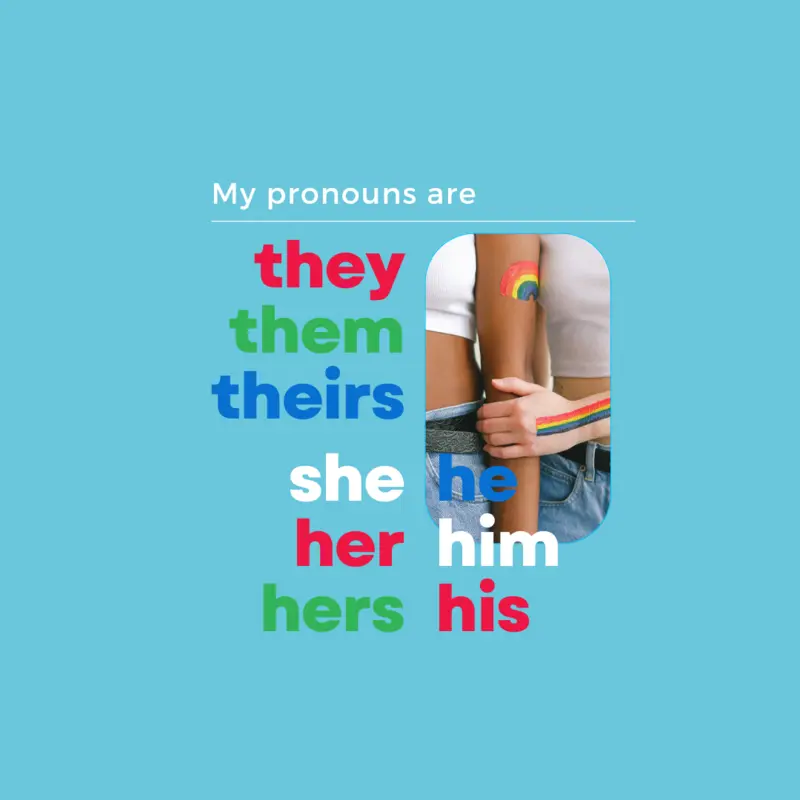Understanding International Pronoun Day: Insights from a care leaver
Date published
15 October 2024
15 October 2024

Have you heard about International Pronoun Day? This important day raises awareness about the significance of using correct pronouns to respect people’s identities.
As our care leaver stated, “International Pronoun Day raises awareness about the importance of using correct pronouns to respect people's identities. It aims to normalise pronoun usage in daily life, promoting inclusivity and respect.”
This day is a reminder that how we address each other matters deeply.
Pronouns are not just grammatical tools; they are vital in expressing how individuals see themselves. Our care leaver shares, “Pronouns are vital because they reflect how people see themselves and want to be addressed. Using the correct pronouns validates their identity and shows respect, fostering a more inclusive environment.” When we use the correct pronouns, we affirm each person’s unique identity and contribute to a culture of acceptance. For example, our care leaver uses she/they pronouns.
“When people respect my pronouns, I feel recognised and valued,” they explain.
This simple act of recognition can have a profound impact on someone’s sense of self-worth and belonging.
Discussing pronouns can sometimes feel awkward. Our care leaver notes, “Yes, I have had to explain my pronouns to someone. While it can be awkward, explaining pronouns can lead to positive experiences when the other person is open to learning.” These conversations not only educate the individual you’re speaking with but can also influence their future interactions with others.
Unfortunately, many people remain unaware of the importance of using correct pronouns.
“Awareness is lacking,” our care leaver observes. “Although some places are improving, many people remain uneducated, leading to misunderstandings or disrespect. More education and open dialogue are needed in schools and communities.”
Making assumptions about someone’s pronouns without asking can feel invalidating.
As our care leaver points out, “Assuming pronouns without asking can feel invalidating and harmful. It reinforces stereotypes and can cause discomfort.”
A more respectful approach is to ask or use gender-neutral pronouns until clarified. If you’re unsure how to ask someone’s pronouns, our care leaver recommend, “Ask respectfully by saying, 'What are your pronouns?' or offering your own first. If unsure, use gender-neutral pronouns. People will appreciate the effort to address them correctly.” This simple act fosters a more inclusive atmosphere.
Celebrating International Pronoun Day can significantly reduce discrimination and bias.
Our care leaver believes, “Yes, International Pronoun Day can reduce bias by raising awareness and educating people on gender identity. It encourages conversations that challenge stereotypes and promote inclusivity.”
This day serves as a catalyst for dialogue and understanding. To create a more inclusive environment, they suggest we need to normalise sharing pronouns in everyday settings and increase education about gender inclusivity. “We need to enforce policies that protect against gender-based discrimination,” they emphasise.
For foster carers and fostering agencies, the commitment to using correct pronouns is essential both on International Pronoun Day and every day.
“Foster carers can educate themselves, ask for pronouns respectfully, and create a supportive environment where pronouns are respected,” our care leaver advises. “Advocating for inclusivity daily, not just for pronoun day, will help create a respectful and understanding environment.”
International Pronoun Day is more than just a day on the calendar; it’s an opportunity for all of us to reflect on our language and the impact it has on the identities of those around us. Let’s take this day as a chance to commit to respecting and affirming each other’s identities, fostering a culture of inclusivity and understanding.
Read our recent foster carer stories here.
Young Persons Voice
15 October 2024